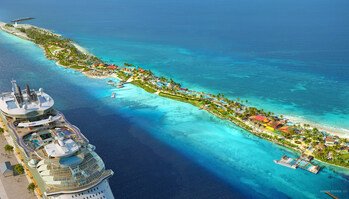NASSAU, BAHAMAS — Environmentalists said yesterday that Royal Caribbean’s environmental pledges for its beach club development on Paradise Island were insufficient to deter them from their requests for information regarding the project.
“While we appreciate RCI’s commitments, what the company announced was insufficient to deter us from our request for information. We still do not have any real, meaningful details on RCI’s environmental plans, or answers to the numerous questions we’ve posed. This remains a significant problem for us,” the environmentalists responded in a statement.
Calls were renewed for RCI to provide online public access to all documents related to the beach project submitted to the government, inclusive of the cultural and environmental impact assessments and management plans; responses and mitigation plans related to the beach project submitted to the government by Royal Caribbean; open in person and online town-halls at which members of the public will be permitted ample time to express their views, and a commitment to making transcripts available online; written responses by Royal Caribbean to numerous unanswered questions shared by The Bahamas’ business and environmental communities regarding the impact of its proposed project; and the publication of an environmental review timetable, including a schedule of town-halls and public comment period, by no later than April 30, 2023.
“We also remind the public of the views expressed by Joe Darville, Executive Chairman, Save The Bays, about the site of RCI’s proposed beach club. Mr Darville was emphatic that the property, and especially the remnant pristine crown land beach, is ill-suited and incapable of absorbing the impact of the estimated 3,000 visitors that RCI plans to descend on the site daily,” the statement read.
“We continue to believe that the site cannot survive intact and faces full transformation and total decimation of its physical assets. The precedent for grossly exceeding a small area’s carrying capacity is as per the permanent and irreversible impact RCI had on the Bahamian island Little Stirrup Cay, whose Bahamian name couldn’t even survive the undue pressure to transform to Coco Cay.”
Royal Caribbean on Sunday outlined its environmental plans for its beach club development at Paradise Island, which it claims will be a 100 percent renewable energy development by the year 2030. The company said in a statement that the six key components of its environmental plan for the beach club development are zero waste-to-landfill, renewable energy, wastewater treatment, protecting and enhancing the surrounding habitats, and environmental monitoring.
The company projected that the development will contribute zero waste to the New Providence landfill.






